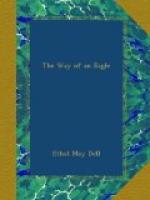“I must go back to the guns,” he said, and the next moment was gone, striding carelessly down the passage, and whistling a music-hall ballad as he went.
CHAPTER II
A SOLDIER’S DAUGHTER
In the centre of the little frontier fort there was a room which one and all of its defenders regarded as sacred. It was an insignificant chamber, narrow as a prison cell and almost as bare; but it was the safest place in the fort. In it General Roscoe’s daughter—the only white woman in the garrison—had dwelt safely since the beginning of that dreadful siege.
Strictly forbidden by her father to stir from her refuge without his express permission, she had dragged out the long days in close captivity, living in the midst of nerve-shattering tumult but taking no part therein. She was little more than a child, and accustomed to render implicit obedience to the father she idolised, or she had scarcely been persuaded to submit to this rigorous seclusion. It would perhaps have been better for her physically and even mentally to have gone out and seen the horrors which were being daily enacted all around her. She had at first pleaded for at least a limited freedom, urging that she might take her part in caring for the wounded. But her father had refused this request with such decision that she had never repeated it. And so she had seen nothing while hearing much, lying through many sleepless nights with nerves strung to a pitch of torture far more terrible than any bodily exhaustion, and vivid imagination ever at work upon pictures more ghastly than even the ghastly reality which she was not allowed to see.
The strain was such as no human frame could have endured for long. Her strength was beginning to break down under it. The long sleepless nights were more than she could bear. And there came a time when Muriel Roscoe, driven to extremity, sought relief in a remedy from which in her normal senses she would have turned in disgust.
It helped her, but it left its mark upon her—a mark which her father must have noted, had he not been almost wholly occupied with the burden that weighed him down. Morning and evening he visited her, yet failed to read that in her haunted eyes which could not have escaped a clearer vision.
Entering her room two hours after his interview with his officers regarding her, he looked at her searchingly indeed, but without understanding. She lay among cushions on a charpoy of bamboo in the light of a shaded lamp. Young and slight and angular, with a pale little face of utter weariness, with great dark eyes that gazed heavily out of the black shadows that ringed them round, such was Muriel Roscoe. Her black hair was simply plaited and gathered up at the neck. It lay in cloudy masses about her temples—wonderful hair, quite lustreless, so abundant that it seemed almost too much for the little head that bore it. She did not rise at her father’s entrance. She scarcely raised her eyes.




